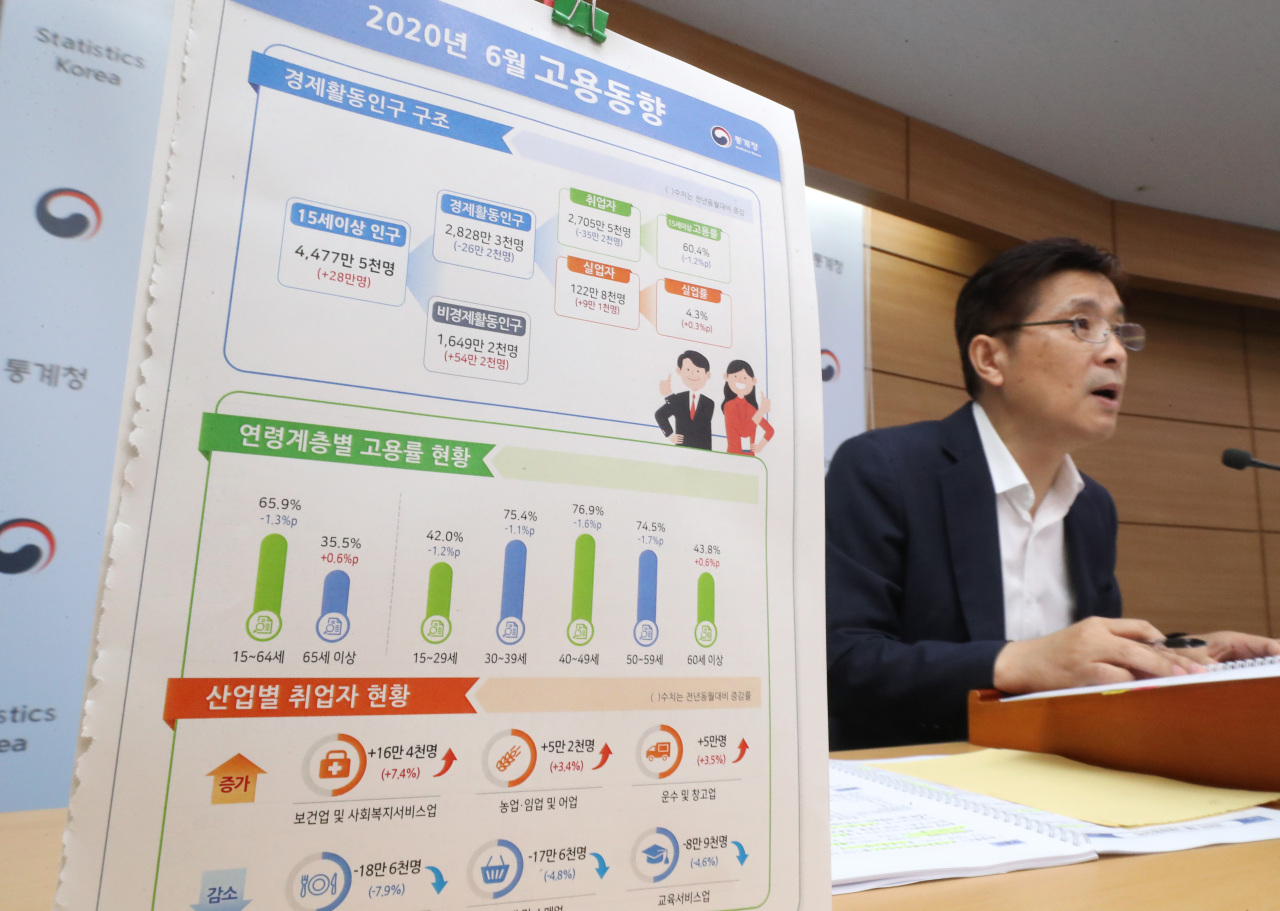Reeling under the prolonged impact of the COVID-19 fallout, South Korea shed over 350,000 jobs in June, marking the fourth consecutive monthly fall in employment for the first time since the global financial crisis, government data showed Wednesday.
The number of people unemployed and the unemployment rate hit record highs, weighed down by the massive contraction in service sectors.
According to the monthly employment trend compiled by Statistics Korea, the number of employed people across the country stood at 27.06 million as of end-June, down 352,000 from a year earlier.
Though this latest on-year decline was a slowdown from April and May -- when the country faced the fastest pace of epidemic spread and consequently strong social distancing rules -- it prolonged the job market contraction for four months straight.
The last time that the country saw its employment volume slip for four or more months in a row was from October 2009 to January 2010, in the wake of the global financial crisis.
The sector hit the hardest was the lodging and restaurant business which lost 186,000 jobs on-year in June, followed by wholesale and retail which lost 176,000 jobs. Education and manufacturing shed 89,000 and 65,000 jobs, respectively.
The welfare sector, on the other hand, gained 164,000 new jobs during the same period.
“While the coronavirus has affected all industrial sectors, the face-to-face service businesses took the hardest blow,” said Chung Dong-myung, director for social statistics.
The country’s jobless rate climbed 0.3 percentage point on-year to 4.3 percent in June, while the total number of unemployed people was 1.23 million, up 91,000 on-year. Both figures were the highest observed since 1999 when the statistics office started tallying such data.
Per age group, the number of employed people rose among those aged 60 or more -- 338,000 in June. All other groups, however, saw the corresponding figure slip.
Per employment pattern, 494,000 temporary or daily jobs disappeared, while 349,000 regular jobs were added, reflecting the widening gap in the job market.
The number of those temporarily on leave – who are technically classified as employed -- stood at 729,000 in June, up 97.7 percent from a year earlier.
“The number of people on temporary leave soared mostly in the service sectors due to the COVID-19 fallout,” Chung said.
The latest monthly figure, however, was down from the March-May period, when the corresponding figure remained above the 1 million mark, he added.
“Despite persisting uncertainties and challenges, (the domestic job market) is slowly recovering from the COVID-19 shock, after hitting the low point in April,” Deputy Prime Minister and Finance Minister Hong Nam-ki wrote on Facebook, following the statistics announcement.
The fiscal chief nevertheless expressed concerns about individual business sectors such as manufacturing, as well as young people that continue to struggle for jobs.
The employment rate for those aged between 15 and 64 -- the comparative standard used by the Organization for Economic Cooperation and Development -- came to 65.9 percent, down 1.3 percentage point on-year, data showed.
The employment rate for young adults -- those aged between 15 and 29 -- also fell 1.2 percentage points on-year to 42 percent.
“(The government) will add full momentum in executing the recently approved third supplementary budget bill and the Korean New Deal action plans,” Hong said.
The Moon Jae-in administration on Tuesday unveiled the blueprint of its extensive stimulus package -- the Korean New Deal -- that seeks to inject some 160 trillion won ($133.1 billion) over the next five years to create 1.9 million jobs and promote sustainable growth.
By Bae Hyun-jung (
tellme@heraldcorp.com)








